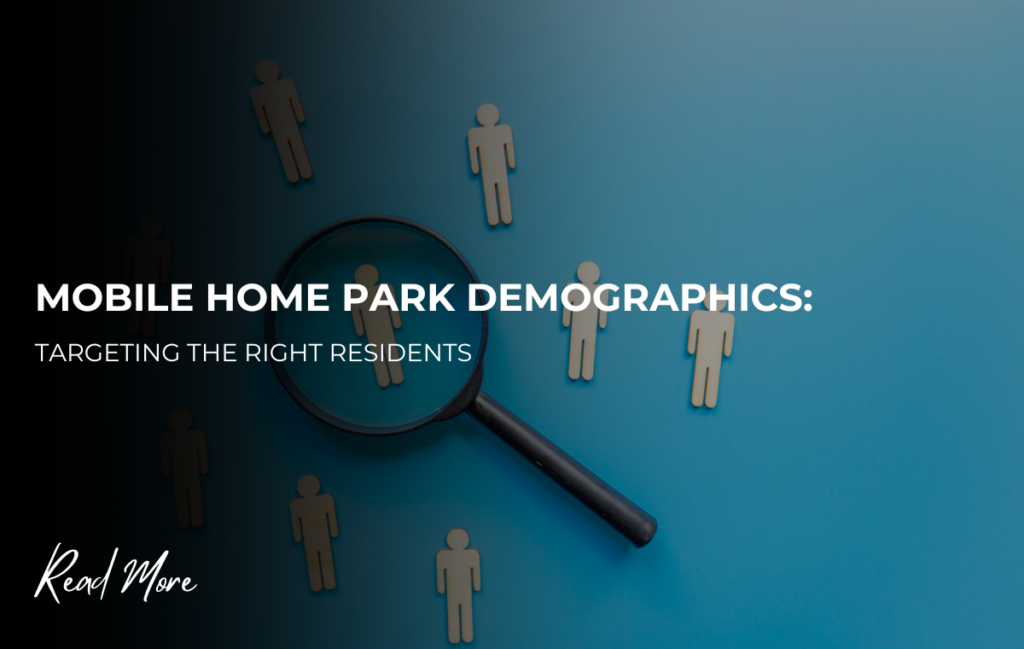Mobile Home Park Demographics: Targeting the Right Residents
-
 Tristan Hunter - Investor Relations
Tristan Hunter - Investor Relations

Identifying and attracting suitable residents can contribute to the potential profitability of a mobile home park. Demographics play a significant role in this process. By analyzing who potential residents could be, investors could tailor marketing and amenities to meet their needs. In this blog post, we will analyze mobile home park demographics to help identify and attract the ideal tenant base for your mobile home park.
Key Demographics
Retirees and Seniors: Retirees are often in search of affordable, low-maintenance living within a community setting. This group could be drawn to mobile home parks that offer amenities such as walking trails, social activities, and convenient access to healthcare facilities. For example, mobile home parks that organize events such as yoga classes or community potlucks could appeal to this demographic. Additionally, retirees tend to prefer quiet, well-maintained environments where they can enjoy their golden years without the stress of managing a larger home.
Low-Income Families: Families with lower incomes might choose mobile home parks for affordability. They often look for safety, good schools, and family-friendly environments. Mobile home parks offering amenities such as playgrounds, picnic areas, and after-school programs could attract these families. Providing affordable housing options within the property, like rent-to-own mobile homes, might appeal to families seeking stability without the financial burden of traditional homeownership.
Working-Class Individuals: Workers in industries like construction, manufacturing, or retail may need affordable housing near job centers. These tenants could prioritize proximity to work, reliable public transportation, and community stability. Offering flexible lease terms, on-site laundry facilities, and a strong maintenance team might be significant selling points for this demographic. Additionally, mobile home parks located near major highways or public transportation hubs could be more attractive to working-class individuals who commute daily.
Regional Trends
Analyzing regional demographics can help pinpoint where demand could be highest:
Population Growth: Regions with rising populations often have a higher demand for mobile home parks. For example, states like Florida, Texas, and Arizona could be seeing significant population growth due to their warm climates and lower costs of living. These areas might attract a mix of retirees, working-class individuals, and low-income families. Focusing marketing efforts on areas with significant population increases could be beneficial, particularly in regions experiencing an influx of residents from more expensive states or cities.
Employment Opportunities: Targeting mobile home parks near employment hubs, especially where blue-collar jobs are prevalent, could be effective. For instance, areas with a strong manufacturing base or a growing construction industry might see higher demand for affordable housing options like mobile home parks. Understanding local industries can help in attracting working-class tenants. Additionally, regions with seasonal employment, such as agricultural areas, could benefit from offering short-term leases or seasonal rental options to accommodate workers, if you are comfortable with the admin intensity behind it.
Economic Conditions: Areas with high housing costs often see more interest in mobile home parks. In cities where housing prices have skyrocketed, mobile homes often present a more affordable alternative. Monitoring local housing affordability trends could provide insights for adjusting strategies. For example, as housing prices continue to rise in urban areas, suburban and rural mobile home parks might become more attractive to residents seeking more space and lower living costs.
Download our FREE eBook and explore the top 20 things Andrew Keel recommends you consider before investing in mobile home parks.

Tailoring Amenities
To attract and retain the desired demographics, offering amenities (if it fits in your budget) that can meet their specific needs could be important:
For Retirees: Offering amenities such as social activities, fitness centers, and easy access to healthcare might appeal to retirees. Retirees often appreciate mobile home parks providing community centers to gather for card games, book clubs, or movie nights. Some mobile home parks might even offer shuttle services to nearby grocery stores, pharmacies, and medical centers, which could be a significant selling point for seniors who no longer drive.
For Families: Providing playgrounds, safe environments, and activities that cater to children and families might be key. Schools nearby could be a big draw. Offering after-school programs, holiday events, and summer camps could keep children engaged and provide convenience for working parents. Family-friendly policies, such as quiet hours and speed limits within the mobile home park can make the environment more appealing to parents concerned about safety.
For Working-Class Individuals: Highlighting the property’s affordability and proximity to job centers could be essential. Simple, well-maintained facilities can be attractive to this demographic. Offering amenities such as secure parking, on-site storage units, and affordable utility packages could be appealing. Additionally, providing flexible payment plans or rent incentives, such as discounts for early payment, might help ease financial stress for tenants living paycheck to paycheck.
Effective Marketing Strategies
Reaching the target demographics effectively might require a data-driven and tailored marketing strategy:
Online Advertising: Targeted ads on platforms like Facebook and Google could reach specific demographics. For example, creating ads that highlight the community aspects of a mobile home park for retirees or emphasizing affordability and convenience for working-class individuals could be effective. Emphasizing the mobile home park’s unique benefits for each group could also be beneficial. Retirees might respond well to ads focusing on tranquility and social opportunities, while families might be drawn to content about safe, family-oriented environments.
Local Outreach: Partnering with local organizations, businesses, and social services might increase visibility. Establishing relationships with local employers could also be beneficial, as they might refer employees to the mobile home park. Community involvement might lead to higher occupancy rates. For instance, sponsoring local events or participating in community fairs could raise awareness of the property and its offerings.
Content Marketing: Creating blog posts, videos, and social media content addressing the needs of the target audience might be effective. Showing potential tenants why a mobile home park might be a perfect fit could be crucial. For instance, a blog post discussing the benefits of mobile home living for retirees, complete with testimonials from current residents, could be a powerful tool. Similarly, videos showcasing the amenities, community events, and resident experiences could help potential tenants envision themselves living on the property.
Retaining Ideal Residents
Attracting residents can only be half the battle; keeping them satisfied and engaged could be equally important for potential long-term success:
Regular Communication: Keeping tenants informed and engaged through newsletters, updates, and community events could foster loyalty. For example, a monthly newsletter highlighting upcoming events, maintenance schedules, and community news might help tenants feel more connected to the property. Additionally, having an online system where tenants could easily access information, pay rent, and submit maintenance requests could enhance their overall experience.
Responsive Management: Addressing tenant concerns quickly and efficiently can help increase tenant satisfaction. Ensuring that maintenance requests are handled promptly and that common areas are kept clean and well-maintained could make a significant difference in how tenants perceive the mobile home park. Regularly checking in with tenants to gather feedback and address any concerns might also help prevent issues from escalating.
Community Building: Organizing social events and clubs to foster a sense of belonging might be beneficial. Tenants could be more likely to stay if they feel part of a community. Consider hosting seasonal events, such as holiday parties, barbecues, or movie nights, to bring residents together. Additionally, creating clubs or interest groups, such as gardening clubs or book clubs, might help residents connect with others who share similar interests.
Leveraging Data
Data could be a powerful tool for making informed decisions and improving the mobile home park’s operations:
Tenant Surveys: Regularly collecting feedback might help understand tenant needs and preferences. Using this data to improve amenities and services could be beneficial. For instance, if surveys reveal that tenants would like more community events or additional amenities, considering those changes might enhance tenant satisfaction and retention.
Occupancy Analytics: Monitoring trends in occupancy rates and tenant turnover could help identify potential issues and adjust strategies accordingly. For example, noticing a spike in turnover during certain months might prompt an investigation into the reasons behind it, leading to steps to address the underlying causes, such as improving amenities or adjusting lease terms.
Market Research: Staying informed about broader market trends in mobile home parks might help adapt to demographic shifts. For instance, as the demand for affordable housing continues to grow, opportunities to expand the property or invest in additional properties in high-demand areas might arise.
Conclusion
By understanding and targeting the right demographics, mobile home parks will likely remain profitable. Tailoring amenities and marketing efforts to meet the needs of retirees, families, and working-class individuals could attract and retain ideal residents. Regularly leveraging data and feedback helps allow for adaptation to changing trends and maintaining a thriving community.
Learn more about mobile home park investing.
Interested in learning more about mobile home park investing? Get in touch with us today to find out more.
Disclaimer:
The information provided is for informational purposes only and is not investment advice or a guarantee of any kind. We do not guarantee profitability. Make investment decisions based on your own research and consult registered financial and legal professionals. We are not registered financial or legal professionals and do not provide personalized investment recommendations.

Tristan Hunter - Investor Relations
View The Previous or Next Post
Subscribe Below 👇





